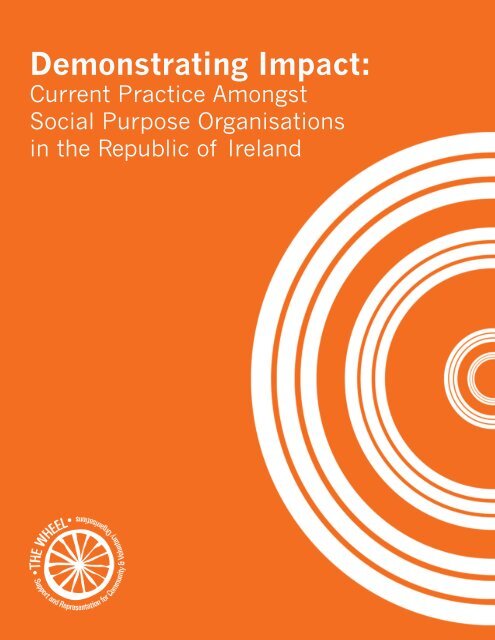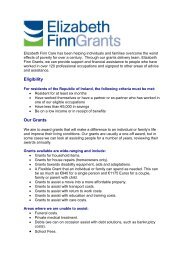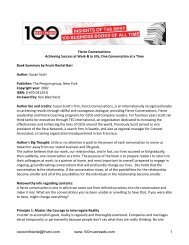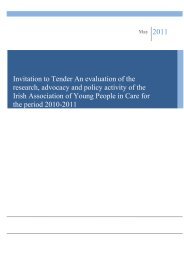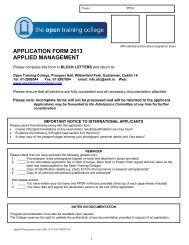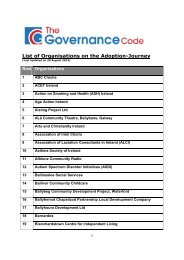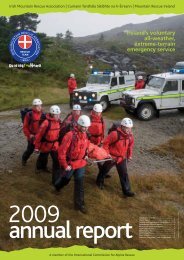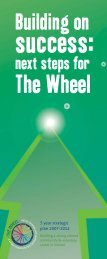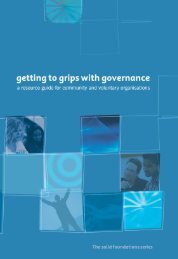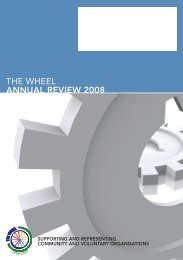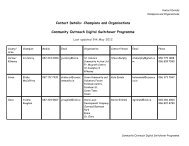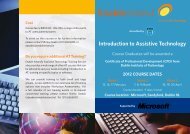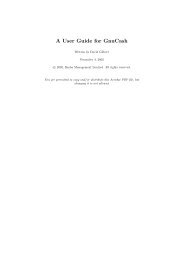Demonstrating Impact: Current Practice Amongst Social ... - The Wheel
Demonstrating Impact: Current Practice Amongst Social ... - The Wheel
Demonstrating Impact: Current Practice Amongst Social ... - The Wheel
- No tags were found...
You also want an ePaper? Increase the reach of your titles
YUMPU automatically turns print PDFs into web optimized ePapers that Google loves.
<strong>Demonstrating</strong> <strong>Impact</strong>: <strong>Current</strong> <strong>Practice</strong> <strong>Amongst</strong> <strong>Social</strong> Purpose Organisations in the Republic of Ireland1 Introduction1.1 It has never been more important for social purpose organisations to focus their limitedresources on maximising positive social change. <strong>The</strong> Calouste Gulbenkian Foundation isfunding a scoping exercise in three countries (England, Portugal and Ireland) to assess theextent to which voluntary not-for-profits and social enterprises are measuring the impactthat they are having and what the enablers and barriers to this are 1 .1.2 This brief report provides a snapshot of the situation in Ireland in November 2011. It doesnot claim to be definitive. Although the term ‘impact measurement’ is used throughout, itshould be noted that this includes the full continuum of measurement; from outcomes, toimpacts, and to social value in its widest sense.2 Research methodology2.1 <strong>The</strong> nature of this project was very much that of a fact-finding mission. <strong>The</strong>re is withinIreland a dearth of written materials relating to the topic of impact measurement and itwas therefore acknowledged from the outset that the vast majority of information wouldhave to be sourced directly from individuals.2.2 <strong>The</strong> consultant and <strong>The</strong> <strong>Wheel</strong>’s Director of Advocacy drew up a list of potentially usefulpersons to speak to. This list was modified during the course of research as differentindividuals were identified. In total, thirteen interviews were conducted; nine were heldface-to-face, with a further four taking place over the telephone. An interview guide wasused to ensure all aspects of the topic were given due consideration. Extensive writtennotes were taken.2.3 A further six people provided useful signposts. <strong>The</strong> consultant’s own experience of impactmeasurement supplemented the views of the interviewees and allowed meaningful analysisto take place.3 History of impact measurement3.1 Over the past 15 to 20 years, there has been a growing focus within the Irish communityand voluntary sector on the need for good governance, planning, quality assurance andevaluation. For organisations in receipt of statutory, foundation, corporate, and especiallyof European Union funding, undertaking evaluations has been the norm for many years.However, such evaluations have been largely focused on outputs and processes and havetended to be retrospective.3.2 Attempting to measure the actual difference made by programmes is a much more recentphenomenon, which commenced approximately 10 years ago, but which has only gainedwider recognition in the past few years.1http://www.wheel.ie/news/impact-measurement-grant-fund-project5
<strong>Demonstrating</strong> <strong>Impact</strong>: <strong>Current</strong> <strong>Practice</strong> <strong>Amongst</strong> <strong>Social</strong> Purpose Organisations in the Republic of Irelandfresh perspective, it is widely recognised that support must be easily available in-country.5.8.2 <strong>The</strong>re are a number of individuals and organisations that are already offering a supportrole in this field and/or that could do so in the future. <strong>The</strong>re is a definite role forintermediary and umbrella organisations, especially <strong>The</strong> <strong>Wheel</strong>, but also for example,Carmichael Centre for Voluntary Groups, the Centre for Effective Services, the DisabilityFederation of Ireland, Dóchas, <strong>Social</strong> Entrepreneurs Ireland, Tosach 46 and the emergingsocialenterprise.ie network 47 . <strong>The</strong>re are also supports that are connected with particularmethodologies, including Nexus/SPEAK Consulting and the Institute of <strong>Social</strong> Auditing ofIreland. Furthermore, there are independent consultants/evaluators with an interest andcertain level of expertise 48 . Finally, at least one private company has commencedoperations in this field 49 .5.8.3 If funders wish the organisations that they support financially to make impactmeasurement a priority, they have a certain responsibility to resource this, both financiallyand otherwise. <strong>The</strong>re is evidence of such an approach amongst foundations and there maytherefore be a role for the European Venture Philanthropy Association 50 , which currentlyhas five members in Ireland. This approach appears to be lacking amongst most statutoryfunders. For example, Pobal previously had a team of people to provide capacity buildingsupport to community groups, but these have been mostly made redundant and ittherefore no longer has the human resources to provide adequate support.5.8.4 A range of supports is necessary in order to effect and sustain impact measurement.Firstly, awareness must be raised, in order to explain what impact measurement is andwhy it is important. Seminars, training courses, articles and similar (especially those thatshowcase success stories), all have a role to play in this regard. Secondly, it must be madeas easy as possible for people to start the process of impact measurement. <strong>The</strong>re is aneed for simple practical tools, clear guidance materials, including a web-based portal touseful resources. Thirdly, one-to-one tailored supports are necessary for thoseorganisations that do not yet have the internal capacity to do this alone; these may berequired over an extended period of time. Fourthly, it is important that none of thishappens in isolation; lessons must be shared and peer support provided through a range ofpublicity and networking activities.5.8.5 It is likely that many organisations will feel overwhelmed at the beginning of their impactjourney. <strong>The</strong>y can be encouraged to start small and to build up gradually. However, it isessential that they assess the full effects of the change brought about by theirorganisations in the medium- to long-term. Unless they do so, there is a real danger of notseeing the bigger picture; that is, their ultimate impact. This idea must therefore bereiterated throughout the support process.5.8.6 Finally, it has become apparent during the course of this research that the need for supportis as great amongst funders as it is amongst social purpose organisations. Awareness musttherefore be raised amongst funders also.4647484950http://www.tosach.ie/shttp://www.socialenterprise.ieFor example http://sheilacahill.ie and http://www.whitebarn.infohttp://www.outcomes.iehttp://evpa.eu.com16
<strong>Demonstrating</strong> <strong>Impact</strong>: <strong>Current</strong> <strong>Practice</strong> <strong>Amongst</strong> <strong>Social</strong> Purpose Organisations in the Republic of Ireland6.1.4 A training course entitled ‘From outputs to outcomes’ is being run (for the second time in afour-month period) by Public Affairs Ireland in February 2012 55 .6.1.5 In early 2012, <strong>The</strong> <strong>Wheel</strong> will produce a community and voluntary sector resource guide onthe topic of adopting an outcomes focus. This will be followed by related initiatives to raiseawareness and build capacity.6.1.6 Gauge intends to hold a social impact summit during 2012 and is keen for this to be across-border event.6.1.7 A revitalisation of the Institute of <strong>Social</strong> Auditing of Ireland is planned for 2012.6.1.8 <strong>The</strong> Disability Federation of Ireland is bringing Charities Evaluation Services over fromEngland during 2012 to deliver outcomes training to its 127 members.6.1.9 <strong>Social</strong> Entrepreneurs Ireland is currently trying to develop a comprehensive system forimpact measurement, including measures of organisational capacity, measures to showhow organisations are using their capacity to produce results, and measures to assess theextent to which the overall problem at hand is being addressed.6.1.10 Pobal, as part of its overall change management strategy, is currently assessing how bestto measure the cumulative impact of all its programmes.6.1.11 In around two years’ time, the Centre for Effective Services will publish the results of itslearning.6.2 Remaining gaps6.2.1 It is clear that there remain numerous gaps. <strong>The</strong>se have been highlighted throughout thetext and are not repeated here. However, a number of issues that warrant furtherconsideration.6.2.2 <strong>The</strong>re is a complete lack of clarity in Ireland about the ‘big questions’. What does a sociallyinclusive community look like? What does social cohesion actually mean? How does onedefine well-being? What are the appropriate roles of central government, local government,the private sector, the not-for-profit sector, academia, etc? Unless the change that isstrived for is somehow defined, with some level of coherence as to how and by whom thatchange will be brought about, Ireland will continue to fumble in the dark.6.2.3 <strong>The</strong> debate about impact measurement should not be restricted to social purposeorganisations; it should also include the state, business, etc. <strong>Social</strong> and environmentalproblems are a reflection of systemic failure and they require systemic response.Government must eventually drive this forward and the next National Development Plan(2014) should explicitly tackle the impact question. Before that time, the community,voluntary and social enterprise sectors have the opportunity and responsibility to engagewith government on this issue, proactively and with an united voice.6.2.4 <strong>The</strong>re are many opportunities for joint working that have yet to be capitalised upon. Moreformal links could be established across sectors, but also between organisations within thenot-for-profit sector.55http://www.whitebarn.info/s/new-training-course-from-outputs-to-outcomes18
<strong>Demonstrating</strong> <strong>Impact</strong>: <strong>Current</strong> <strong>Practice</strong> <strong>Amongst</strong> <strong>Social</strong> Purpose Organisations in the Republic of Ireland6.2.5 <strong>The</strong> legitimate need that funders have for accountability must be balanced with a criticalunderstanding of the change process and organisations’ ability to influence this changepositively. <strong>The</strong> ‘command and control’ model in which funders defined goals, gave grantsto those that they hoped might meet these goals, and provided some money towardsinadequate evaluations that were generally ignored, was bereft of responsibility and is nolonger acceptable.6.2.6 <strong>The</strong> focus from now on must be on ‘strategic learning’ and ‘utilisation focused evaluation’ 56 .<strong>Impact</strong> measurement should not be viewed in isolation; it must be integrated with thewhole organisational development agenda. Funders can incentivise and support this in anumber of ways that include: engaging in joint scenario planning; requiring outcomesfocusedinitial plans; ensuring logical evaluation frameworks and data collection systems arein place at the start of programmes; sharing information about what worked and what didnot work; and by continuing to fund evidence-informed programmes. Critically, fundedorganisations also have a responsibility to stop advocating for something if (good) researchprovides evidence that it does not work.6.2.7 <strong>The</strong>re are two final significant gaps. <strong>The</strong> first relates to how one effectively measurescollective impact. Although cluster evaluations and impact networks are being discussed,this is a totally underdeveloped area. <strong>The</strong> second relates to the absence of quality controlmeasures 57 for impact measurement, which raises questions about the potential need forstandards and external verification.7 Conclusion7.1 Although it can be argued that Ireland is ‘behind’ in terms of its progress, it should also beacknowledged that the whole field of impact measurement is still in its infancy. <strong>The</strong>re isundoubtedly significant scope for development of impact measurement within Ireland, yetthere are also examples of highly advanced initiatives that it can share with the world. Onthe whole, social purpose organisations are receptive to the idea of impact measurement,but require supports in order to progress it. Funders also require education on impactmeasurement. <strong>The</strong>re is now a clear need for different actors to come together to adopt acoherent approach towards impact measurement. This ought to be possible in a countryas small as Ireland.5657http://www.sagepub.com/books/Book229324<strong>The</strong> accreditation and assurance process of the SROI Network is a notable exception, http://www.sroi-uk.org19
<strong>Demonstrating</strong> <strong>Impact</strong>: <strong>Current</strong> <strong>Practice</strong> <strong>Amongst</strong> <strong>Social</strong> Purpose Organisations in the Republic of IrelandNOTES:20
<strong>The</strong> <strong>Wheel</strong> is a representative and support body for community,voluntary and charitable organisations; a one-stop-shop for and aboutthe Irish not-for-profit sector. Established in 1999, it now has almost900 members, including most of the country’s largest charities andmany more smaller and medium-sized groups. It also works withmany non-members within Ireland’s highly diverse community andvoluntary sector to strengthen the sector’s capacity and capability.www.wheel.ieThis report is supported by:<strong>The</strong> Calouste Gulkenkian Foundation is an internationalcharitable foundation with cultural, educational, social andscientific interests, based in Lisbon with offices in Londonand Paris. <strong>The</strong> purpose of the UK Branch is to help enrichand connect the experiences of people in the UK and Irelandand secure lasting and beneficial change. We have a special interest in supporting thosewho are most disadvantaged and we place a particular emphasis on maximising the beneficialimpact of our work through encouraging cross-border exchanges of lessons and experiences.As a small branch of an international foundation we can be nimble but cannot provide largescalecontinuous funding. As part of one of the largest European foundations we are well positionedto address transnational issues and can act as an ‘exchange’ for ideas.<strong>The</strong> <strong>Wheel</strong>48 Fleet Street(entrance Parliament Row)Dublin 2Find us on:Telephone +353 (0) 1 454 8727Email info@wheel.ieCharity No. 13288Company No. 302282


